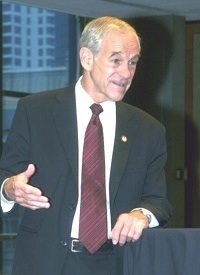
“The American public needs to know and understand that the government that serves best is the one that serves less.” This is how Judge Andrew Napolitano concluded his debut episode of Freedom Watch on the Fox Business Network on June 12. His words aptly defined the premise of the first episode, which he called a “summit” of the Tea Party movement.
The Tea Party movement has attracted a number of libertarians, since the movement’s rallying cries have largely advocated for a reduction in government expenditures and restoring personal liberties and the free market. The two prime political representatives for the Tea Party movement are former Alaskan governor Sarah Palin and Texas Congressman Ron Paul, a social conservative and political libertarian respectively. (Paul’s personal moral views could also accurately be described as "socially conservative," but he staunchly defends the Tenth Amendment’s mandate to leave the enforcement of moral norms to the states and the people.) Napolitano staged a “tea party summit” in his debut episode to hammer out the sharp differences between social conservativism and libertarianism and allowed his audience to see the common ground between the two faces of the Tea Party movement.
Palin and Paul agreed on a majority of the issues, specifically that the government should limit itself to the parameters set in the Constitution and that Americans’ civil liberties should not be violated by the federal government.
Where the two seemed to disagree was on whether America should engage in pre-emptive wars and when (and if) government regulation in private enterprise is ever appropriate. Paul, as a true libertarian and constitutionalist, believes that the U.S. military should be used defensively, while less constitutionally astute social conservatives like Palin adhere to Ronald Reagan’s philosophy of seeking peace through strength, though through an interventionist foreign policy not envisioned by America’s founders. Paul believes that the majority of government regulation has proven to be obstructive while Palin defends some government regulation, such as overseeing oil companies.
Furthermore, Paul believes that the United States should adopt the Founding Fathers’ strict non-interventionist policy, while Palin believes that America should be responsible to its allies.
Later in the episode, Ron Paul’s son, Kentucky Republican senatorial candidate Rand Paul, appeared and seemed to embody ideas that balanced social conservatism and libertarianism.
The Tea Party summit also featured Tea Party favorites Senator Jim DeMint of South Carolina, Representative Michele Bachmann of Minnesota, and the former House majority leader Dick Armey of Texas.
Democratic Pennsylvania governor Edward Rendell served as the lone voice of opposition to the Tea Parties on Freedom Watch. Rendell once declared that the Tea Party movement was nothing more than a group of angry people that received far too much media attention. On Saturday’s episode, however, he appeared far more agreeable with the Tea Party cause, prompting Napolitano to assert that he expects to see Rendell at the next local Tea Party meeting.
Despite staunch criticism from the Left, 40 percent of the Tea Party movement consists of Democrats and Independents, according to the Los Angeles Times April 5, 2010 article “Myth-busting polls: Tea Party members are average Americans, 41 percent are Democrats, independents.”
At the end of his first episode, Napolitano asked his viewers to email him with their “dream 2012 presidential candidate.” The responses are overwhelmingly in favor of Ron Paul, Sarah Palin, and Napolitano himself, thus far.
While the Fox Business network does not currently subscribe to Neilson Ratings, oppositional reaction to the show is indicative of its initial success. Liberal commentator Bill Press, who authored “Toxic Talk: How the Radical Right Has Poisoned America’s Airwaves,” and blamed Fox News for creating the Tea Party with town halls, claims that Fox News has “now given the Tea Party its own TV show” by broadcasting Napolitano’s Freedom Watch. Given Fox Business Network’s struggles with acquiring a loyal audience, Press has asserted that by adding Napolitano’s show to the roster, the FBN “just decided to make it the second propaganda channel.”
In contrast to Press, libertarian groups have indicated their support of the show. According to Lee Rockwell, chairman of the libertarian Ludwig von Mises Institute, Freedom Watch is “the most important libertarian broadcast in the history of the American media. There has never been a show willing to address the difficult subjects involving liberty as this one does, let alone to do it so effectively and entertainingly. And Republican statism gets no free pass.”
Napolitano has proven this in the past, as he was largely critical of the Bush administration for using American fear of terrorism to justify the retraction of civil liberties. He now serves as a staunch critic of the Obama administration.
Freedom Watch began as a weekly webcast in 2009 and has always been a forum of libertarian ideology. Now that the Fox Business Network has picked up the show, it will air on Saturday mornings with primetime reruns on Saturday and Sunday.
Napolitano, who asserts that libertarians have been removed from political debate for far too long, joins the ranks of notorious libertarian news anchor John Stossel, who was added to the FBN last fall. Both Stossel and Napolitano are aggressively pro-civil liberties and anti-big government.
Next week’s episode of Freedom Watch will feature special guest Glenn Beck, a self-proclaimed libertarian. Together, they will be “defending freedom,” the closing catch phrase for Freedom Watch.




